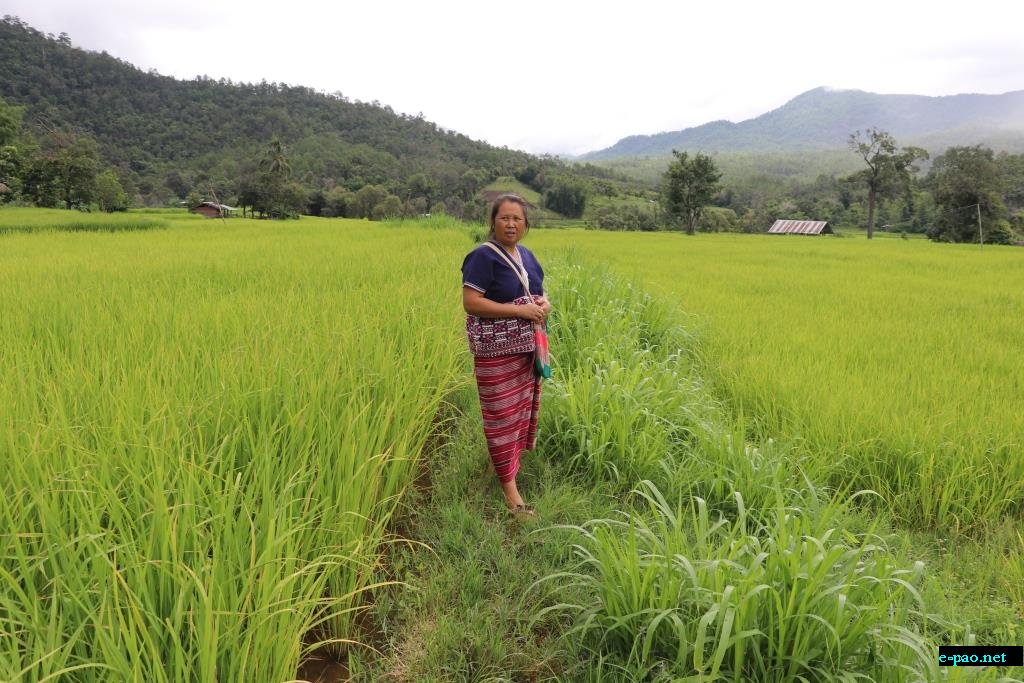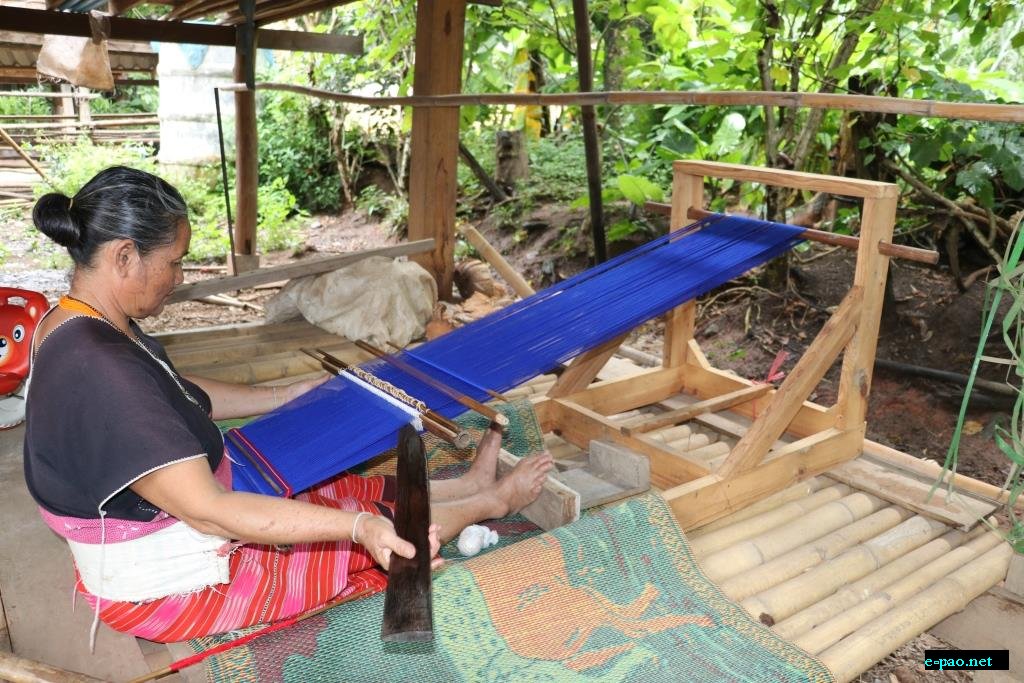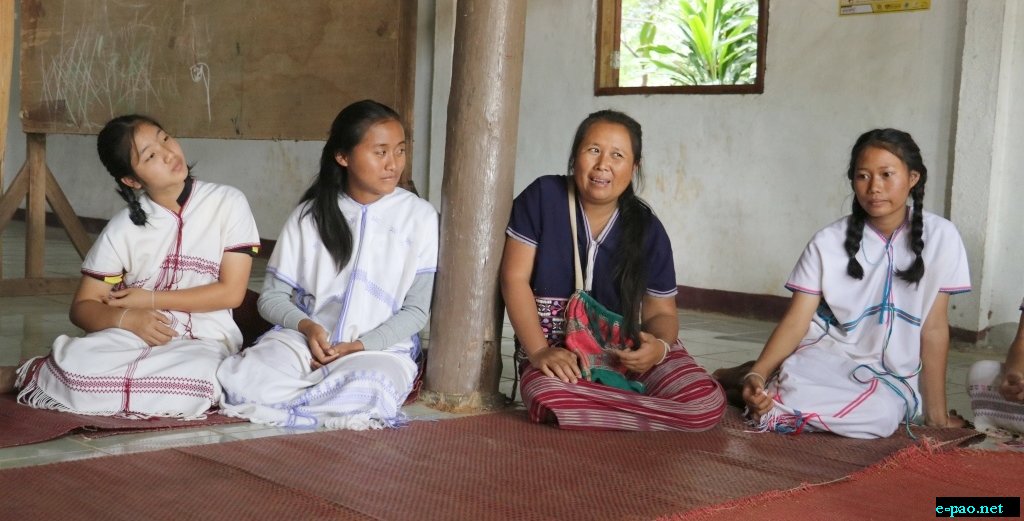The Karen people's pursuit for survival in Northern Thailand
Jiten Yumnam *

A Karen woman in Huay E-Khang Village
An uphill winding road amidst lush green thick forest in Northern Thailand led us to the Huay E-Khang Village, bounded by Rice fields and wooden thatched houses. The village inhabited by the Karen people, a major indigenous people of Thailand, is a two hours' drive from Chiang Mai City. The visit, as part of an exposure visit of indigenous youths attending the Third International Indigenous Youth Conference, organized by the Asia Pacific Indigenous Youth Network, from 5-9 September 2016 in Chiang Mai, familiarized us to unique way of life of Karen and changing realities within.
The Karen people, who also inhabit parts of Burma, Laos and Thailand, practiced rotational farming, cultivating rice and seasonal vegetables. The traditional system of governance still exists to regulate the functioning of social and cultural affairs, in full conjunction with modern village administration, more to regulate Government's development activities. The Karen people practices Animism, Buddhism and Christianity as their religion.
An interaction with Huay E-Khang villagers reveals some of the principal concerns and affirmative initiatives among the Karen people. Challenges include the Thai Government's non-recognition of their rights over their land, the continued expansion of forest areas for conservation measures and repression of community leaders defending their rights and land. Additionally, a complex survival challenge of Karen refugees from Burma persists. A change in traditional agriculture practices is also evident. A remarkable effort to propagate the Karen's traditional knowledge of Karen among youths is visible.
A shift in traditional agriculture practices is clear in Huay E- Khang village, indicating adverse impacts of globalization in sustainable management of land and forest. Agriculture practices used to be organic earlier, but commercial agriculture embedded with chemical use and pursuance of cash crops threatens traditional agriculture practices, such as rotational farming, characterized by sharing of community labour and establishment of village rice banks for seeds sharing and use during food shortages among villagers. Agriculture expenses increased and villagers started borrowing to sustain agriculture, indebting many villagers.
Climate change and decrease in rainfall further led to difficulty to grow traditional crops, impacting food sovereignty and food produce. Many families finds extremely difficult to support education for children, while also compelling youths to migrate in cities and smaller towns, such as in Chiang Mai, Chiang Rai, Bangkok etc, for employment avenues. The situation led to much worry among the elders, compelling them to seek solutions.
As one of mitigation measures, villagers of Huay E-Khang imposed restriction on plantation of cash crops and the use of chemicals in rotational farming areas. Another affirmation action is conscious efforts to transmit traditional knowledge to their younger generations.
Noraeri Thungmueangthong, a Karen woman leader shared her people's effort, especially women to impart traditional knowledge to the younger generations, including Karen language, script and their history of their land. Karen youths are encouraged to go with their parents to learn the spiritual connection and sustainable management of their land and forest, such as tying of umbilical cords of new born babies to trees for forest protection.

A Karen woman weaving traditional clothes
Legends of Karen believed the spirits and health of the person with the umbilical cord grows along with the trees and the forest. Preservation of seeds, learning traditional cooking with recipes from nearby forest, learning folk stories, weaving of traditional clothes is educated to younger generations. Karen dances, ceremonies, traditional medicinal practices, handicraft are imparted as well.
The efforts help inculcate Karen youths to value importance of transferring the traditional knowledge for protection of their community land, cultures and their identity and further to feel proud to be a Karen, in learning the rich values of their traditional knowledge, practices and other cultural and natural heritages.
Ms. Noraeri continues to share that in Thailand, land belongs to the State and the collective right to land is still not recognized. Karen people are still striving for the recognition of their communal land title. One of the serious challenges among the Karen people is the continued effort of the Government of Thailand to expand forest land areas, for conservation measures and setting up of national parks, without recognizing her peoples' rights over forest. On 7 September 2016, the Central Administrative Court of Thailand pronounced a ruling insensitive to Karen peoples' traditional way of life and relationship with their land.
The matter relates to an incident of arsoning of around 100 Karen homes and their barns, in Pong Luk Bang Kloy village in Phetchaburi Province in May 2011 by officials of the Department of National Park (DNP) and the Ministry of Natural Resources and the Environment (MNRE), Government of Thailand, on charges of 'encroaching' on Kaeng Krachan National Park .
The court, based on a complaint filed by Karen villagers, ruled that the park officers of DNP had the right to enact measures to take down structures in the park under Article 22 of the 1961 National Park Act. In its verdict, the court blamed Karen people for encroaching upon forestland to expand their community and farms. The court also barred the community from returning to the land, which the Karen considered as belonging to their ancestors.
The Karen had been living in Ban Bangkloi Bon in Phetchaburi's Kaeng Krachan district for generations, until the evictions began and before the National Park was established in 1981. "The ruling that the Karens had 'encroached' forestland only affirms the general lack of understanding on our histories and sustainable traditional practices and livelihoods," said Wut Boonlert of the Karen Network for Culture and Environment. The court, however, ordered DNP to pay each Karen villager whose house was burned down 10,000 Thai Baht in compensation for property loss. The meager amount is incommensurate to compensate for destruction of homes, way of life and their survival dependence on their land and forest.
The court verdict also comes amid widespread forced evictions and criminalization of Karen people and other hill tribes in forest areas across Thailand. In July 2014, three Karen families had their lands 'reclaimed' by the Forest Department and in October, 37 Karen were convicted on pretext of encroachment and illegal logging for cutting trees to build their homes in northern Mae Hong Son province. Such cases have increased exponentially after the ruling National Council for Peace and Order (NCPO) enacted Order No. 64/2014 to increase forest cover at the expense of indigenous peoples rights.
Community leaders striving for protection of indigenous peoples' way of life are also subjected to direct infringement of their human rights. One Pawlajee "Billy" Rakjongcharoen, who had demanded justice for the Karen communities evicted from the National Park, remained disappeared since April 2014. He was apprehended for possession of illegal honey.
The main suspect in his disappearance has been acquitted and even promoted within the Department. The Park Chief had already been under investigation for the killing of another Karen activist in 2011. Interventions from UN human rights offices such as the Office of the High Commissioner on Human Rights to secure his release or locate his whereabouts remained unheeded . Mr. Billy continues to remain traceless as time goes by.
The Thai Government's effort to repatriate Karen refugees back to Burma is another concern among the Karen refugees, especially those fleeing the conflict afflicted Karen State of Burma. The majority of the refugees are indeed women and children. The refugees were granted temporary refuge in three locations, Mae U Su, Mae Salit and Nong Bua. Since their arrival, local Thai authorities have repeatedly pressured the refugees to return home despite evidence that their land back home is still conflict ridden and unsafe for their return . Karen organizations, including the Karen Women Organization issued appeals against forcible repatriation of Karen refugees, back to a heavily land mined war zone in Burma.

An adept listening of Karen young girls to an elder's sharing on Karen cultures and way of life at Huay E-Khang village, Northern Thailand, 8 September 2016
A strong determination to pursue their way of life, free from undue interference, is easily discernible among the Karen. The Karen people and other indigenous peoples of Thailand have an arduous task to ensure a full recognition of their rights over their land, forest and resources. The recognition of self-determined development and sustainable management of their land, forest and resources, as provisioned in UN Declaration on the Rights of Indigenous Peoples, 2007 and deepening all efforts to prompt the Thailand Government to recognize indigenous peoples' rights remains a venerable challenge.
Security of indigenous human rights defenders requires utmost attention. The political resolution of conflict situation in Karen State in Burma is crucial to end much uncertainty among Karen refugees in Thailand and to realize their aspirations to return home in a safe and secure environment. The exertions to recognize traditional community land ownership and sustainable management of their land and natural resources, including through a conscious effort to propagate traditional knowledge among the Karen younger generation is a critical step towards reinforcing assertion of their inherent survival rights.
The forces of globalization are overtly strong possessing ability to wipe out indigenous cultures and identity, especially by destroying their land and resources. In this onerous situation, the exemplary role of Karen people, especially women to deepen community responsibility to revitalize indigenous knowledge and traditional practices among their youths in a fast globalizing world, with their sacrifices provides succinct hope for realization of Karen peoples' self-determination over their land, lives and future.
* Jiten Yumnam wrote this article for e-pao.net
The writer can be contacted at mangangmacha(AT)gmail(DOT)com
This article was webcasted on November 11, 2018.
* Comments posted by users in this discussion thread and other parts of this site are opinions of the individuals posting them (whose user ID is displayed alongside) and not the views of e-pao.net. We strongly recommend that users exercise responsibility, sensitivity and caution over language while writing your opinions which will be seen and read by other users. Please read a complete Guideline on using comments on this website.








